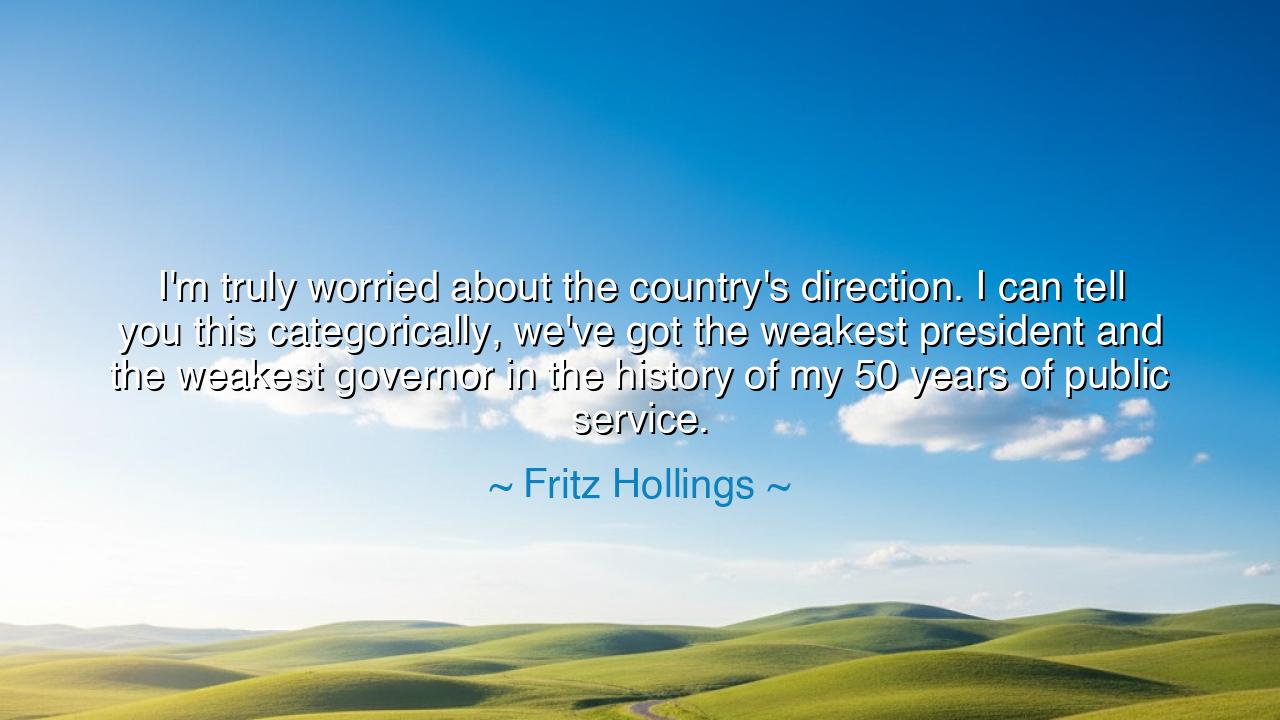
I'm truly worried about the country's direction. I can tell you
I'm truly worried about the country's direction. I can tell you this categorically, we've got the weakest president and the weakest governor in the history of my 50 years of public service.






Hearken, O children of the polis and witnesses to the unfolding of history, and lend your ears to the words of Fritz Hollings, who spoke with the gravity of half a century spent in public service: “I'm truly worried about the country's direction. I can tell you this categorically, we've got the weakest president and the weakest governor in the history of my 50 years of public service.” In these words lies a meditation upon the perils of leadership, the responsibilities of those who hold authority, and the enduring consequences that weak governance can bring upon a nation and its people.
Hollings, a veteran of political life, reflects the concern of one who has witnessed the arc of governance across decades. Leadership is not a mere privilege; it is a sacred trust, a burden of wisdom, courage, and foresight. When those entrusted with power falter, the repercussions extend beyond policy—they touch the lives, security, and moral compass of a nation. History, he warns, is replete with examples where weak leaders have imperiled the stability and future of states, and the citizenry suffers for the failings of those at the helm.
Consider the reign of King Louis XVI of France, whose indecision and inability to respond decisively to crises contributed to the unraveling of his nation. In the absence of strong and principled leadership, unrest festered, economic collapse deepened, and revolution erupted. Hollings’ words resonate with the lesson of history: when authority lacks strength, vision, or courage, the direction of the country falters, and calamity is invited through hesitation and incompetence.
Hollings’ concern is not abstract; it is grounded in the tangible consequences of leadership. In modern times, weak executive decisions can paralyze governance, undermine institutions, and erode public trust. Citizens look to their leaders for guidance during crises, for wisdom in complexity, and for courage when moral and ethical stakes are high. The absence of these qualities fosters uncertainty, instability, and disillusionment, and Hollings’ warning is both prescient and urgent.
Yet within this critique lies a call to civic responsibility. The remedy to weak leadership is not merely lamentation, but engagement, vigilance, and the cultivation of informed judgment among the populace. Citizens, aware of the stakes, must hold leaders accountable, participate in the democratic process, and ensure that those entrusted with authority are worthy of their charge. Hollings’ observation underscores that the health of the state is inseparable from the vigilance and action of its people.
The lesson extends to every sphere of life: leadership, whether in government, community, or family, requires courage, decisiveness, and integrity. Weakness in positions of responsibility produces consequences far beyond the immediate moment, affecting institutions, culture, and the lives of those dependent upon guidance. History serves as a mirror, reflecting both the dangers of ineffective governance and the enduring benefits of strong, principled leadership.
From this insight emerges practical guidance: choose leaders wisely, engage actively in public affairs, and cultivate the virtues of discernment, courage, and foresight in your own actions. Observe the patterns of history and recognize that weak guidance can steer a society into peril, while strong leadership nurtures stability, trust, and progress. Hollings’ words remind us that vigilance and judgment are essential instruments for preserving the health of any polity.
Thus, remember: the strength of a nation is inseparable from the character of its leaders. Fritz Hollings’ warning is a call to both awareness and action. Weak presidents or governors imperil the trajectory of history, yet the people, attentive and engaged, hold the power to demand better, to correct the course, and to ensure that leadership rises to meet the responsibilities it bears. History teaches, and vigilance preserves—heed both.
If you wish, I can also craft a more dramatic, audio-ready version, vividly illustrating historical examples of weak leadership alongside Hollings’ warning to make the message emotionally and intellectually gripping for listeners. Do you want me to do that next?






AAdministratorAdministrator
Welcome, honored guests. Please leave a comment, we will respond soon